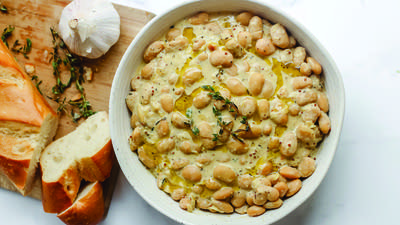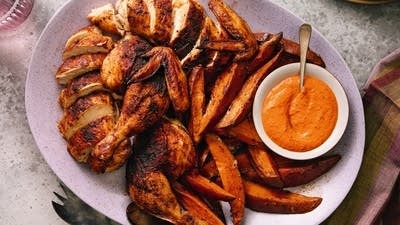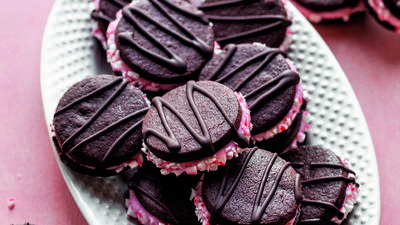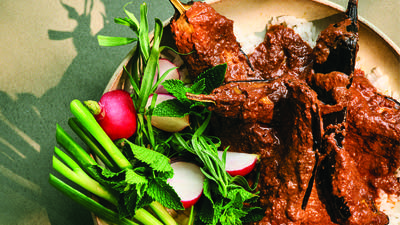
The thought of cooking off-the-cuff can send one person into a creative reverie and another into a dark place of despair. People who can improvise may seem lucky or magical, but we forget that improvisation is all about practice. The more you know, the easier to riff. That's according to Colu Henry, the author of the new cookbook Back Pocket Pasta. Contributor Melanie Dunea talked with Henry about making flawless pasta on the fly. And to help you get into practice mode, try her recipe for Moroccan Lamb Ragu.
Melanie Dunea: I want to be able to make pasta, I want to be able to throw things together easily. Give me your guidelines.
Colu Henry: There are some straightforward free-form things that you need to know in order to be creative with pasta. There's five of them. The first is salt your water well. Well-seasoned pasta water is the key to perfection. You want to be generous with it, about two tablespoons. Don't be shy, it has a lot of seasoning. The next, which is super important, is to cook your pasta al dente because you want that toothsome texture when you bite into the pasta. You don't want soggy pasta. The third is to save the pasta water. This is so important. That salty, starchy liquid is the key thing to bringing everything together. The fourth is to have the pasta and the sauce timed to be done together because the fifth is that you want to finish your pasta in the sauce. It’s important to put the pasta from the pot directly in the sauce and finish it all together for maximum flavor because there's pasta water on the noodle. It's all coming together at the last minute. A lot of people want to go ahead and drain that pasta. I disagree. I feel like it happens á la minute.
 Colu Henry
Photo: Peden + Munk
Colu Henry
Photo: Peden + Munk
MD: Okay, that all sounds doable. What do I have to have in my pantry so that I'll have no-fail pasta dishes?
CH: I love looking at it as a pantry/fridge situation. I would say San Marzano tomatoes, always. I have three to four cans at arm’s length just to be able to reach to and create with. I love having nuts, a variety of them: hazelnuts, walnuts, almonds. You chop them, you toast them, they add great texture. In terms of fridge items, citrus is always great to have: blood oranges, oranges, Meyer lemons, lemons. Then lots of fresh herbs for brightness.
MD: The other night I made your pasta marinara and I didn't have any Parmesan – shame on me – so I substituted Manchego. Are substitutions okay?
CH: Love it! Substitutions are the key to this book. If you want something with more garlic, add it. If you like spicy food, add chilis. If you like broccoli rabe, as opposed to Brussel sprouts, swap it out. Let your spirit be your guide. The whole point of this book is to have fun. Learn what ingredients work together and then just go from there.
 Back Pocket Pasta by Colu Henry
Back Pocket Pasta by Colu Henry
MD: I know you have Italian roots, but I always thought that I wasn't supposed to put shellfish with cheese. Isn't that a no-no?
CH: Everyone loves to say that, but honestly it's one of my favorite things to do. I was in Italy two summers ago with fellow co-author Katie Parla who wrote Tasting Rome; we were out to dinner at this restaurant called Cesare and there was a pasta on the menu which was mussels with Pecorino Romano, my favorite cheese. I said to Katie, “Hold on a second, this was sort of a shameful secret, this is what I do at home.” She said the rules in Italy are that they're made to be broken. I came up with a recipe inspired by that dish and it's in the book.
MD: Talk me through the Moroccan Lamb Ragu. It sounds like something I'd like to make, but is it complicated?
CH: It's not complicated at all. Think about it as a straightforward meat sauce, but using ground lamb as opposed to pork or the traditional beef for a Bolognese. The great thing about it is it's layered with these great Moroccan spices: coriander, cumin, and cinnamon. It all cooks together and the flavors develop, it’s super delicious. The nice, kind of fun thing at the end is you add a dollop of Greek yogurt with fresh mint to bring the dish together.
Before you go...
Each week, The Splendid Table brings you stories that expand your world view, inspire you to try something new, and show how food connects us all. We rely on your generous support. For as little as $5 a month, you can have a lasting impact on The Splendid Table. And, when you donate, you’ll join a community of like-minded individuals who love good food, good conversation, and kitchen companionship. Show your love for The Splendid Table with a gift today.
Thank you for your support.
Donate today for as little as $5.00 a month. Your gift only takes a few minutes and has a lasting impact on The Splendid Table and you'll be welcomed into The Splendid Table Co-op.



